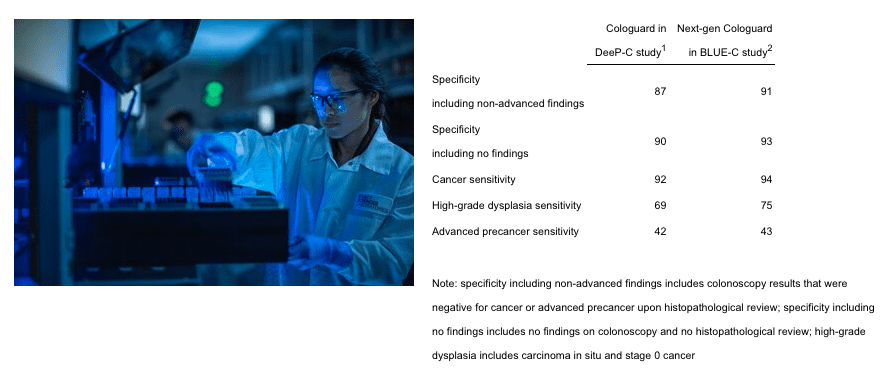20 Jun Next-Generation Cologuard Test Demonstrates 94 Percent Sensitivity For Colorectal Cancer At 91 Percent Specificity, Raising The Bar In Non-Invasive Screening

Madison Haag, clinical laboratory specialist, loads samples for one step of the Cologuard testing process at one of Exact Sciences’ Madison labs.
MADISON, Wis., June 20, 2023 /PRNewswire/ — Exact Sciences Corp. (NASDAQ: EXAS), a leading provider of cancer screening and diagnostic tests, today announced positive top-line results from the pivotal BLUE-C study. The results show that next-generation Cologuard® met all study endpoints and improved every top-line metric, including a 30 percent lower false positive rate, when compared to DeeP-C, the FDA registrational trial for Cologuard.
“Cologuard is a groundbreaking innovation in non-invasive cancer detection. Next-generation Cologuard will set a new performance standard,” said Kevin Conroy, chairman and CEO of Exact Sciences. “We are harnessing deep scientific insights, advanced technology, and over a decade of research and development to detect colorectal cancer with greater sensitivity and significantly improve the false positive rate. Once approved, next-generation Cologuard will meaningfully enhance the patient experience, and it comes at a critical time – when there are 60 million Americans not up to date with screening.”
About the BLUE-C Study
BLUE-C is a multi-center, prospective study (NCT04144738) of more than 20,000 adults 40 years of age and older. The trial was designed to evaluate the performance of next-generation Cologuard (multi-target stool DNA or mt-sDNA). Using colonoscopy as a reference method, the robust study design directly compares multiple screening tests, including next-generation Cologuard and a fecal immunochemical test (FIT). Blood samples were also collected for later evaluation of a blood-based screening test being developed by Exact Sciences. BLUE-C is one of the largest colorectal cancer screening trials ever conducted, and the study population reflects the racial and ethnic makeup of the United States according to the 2020 census.



